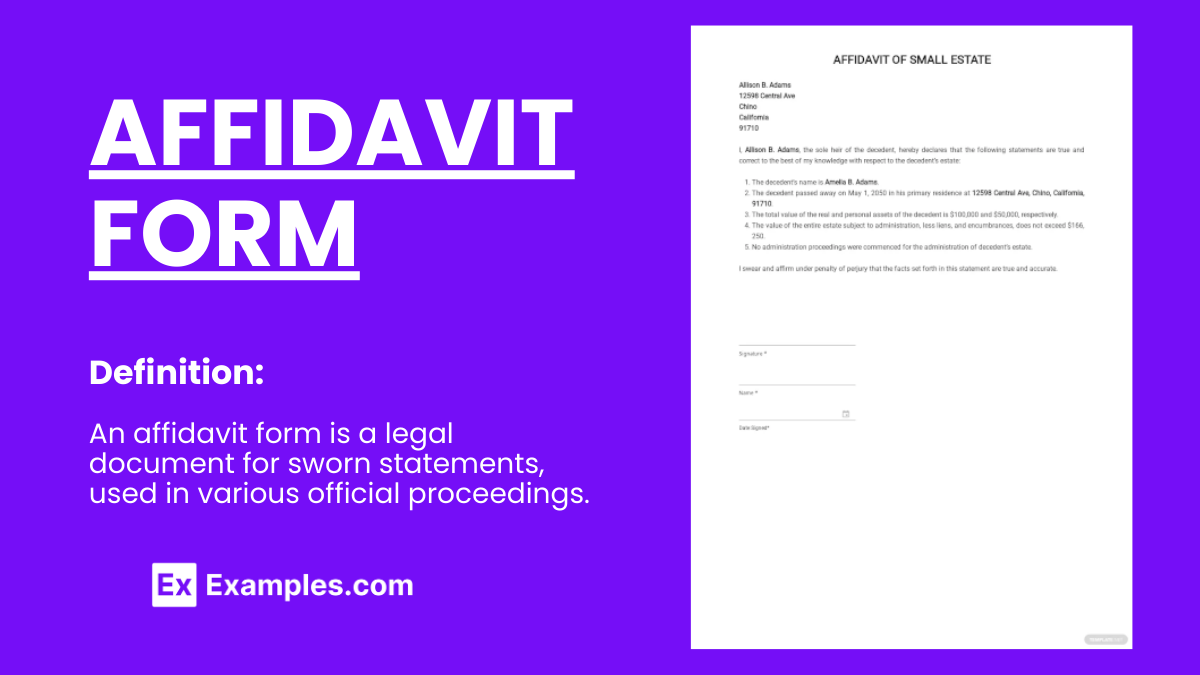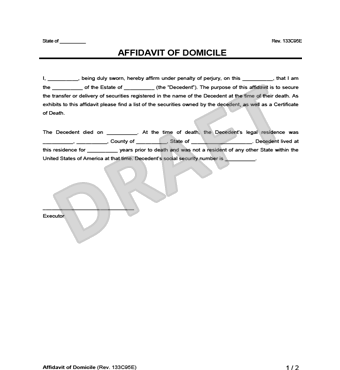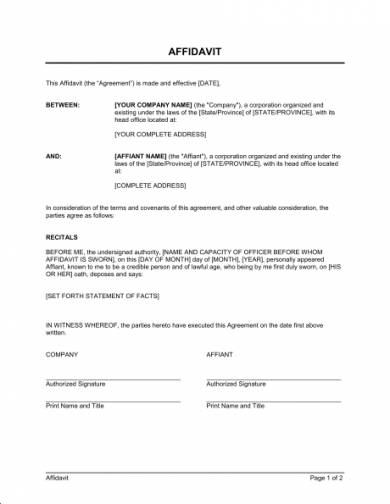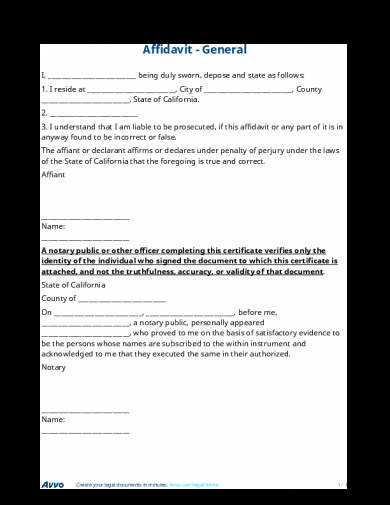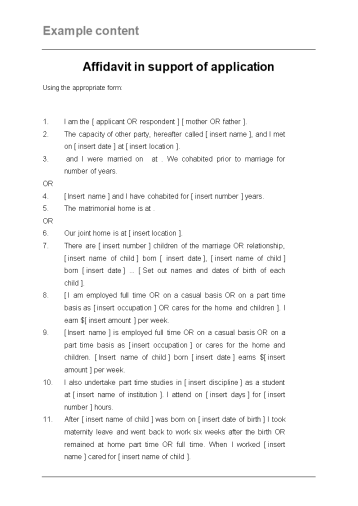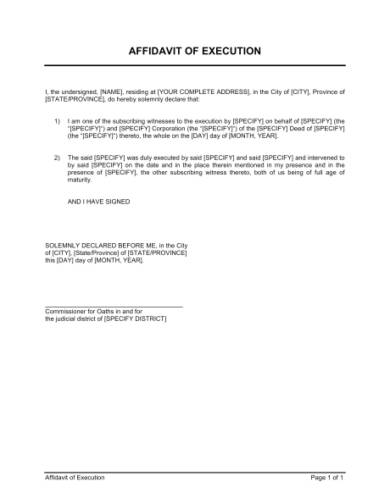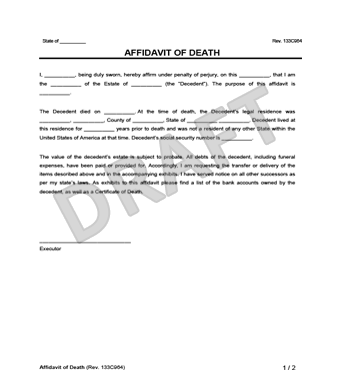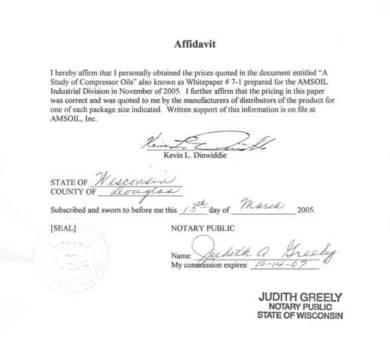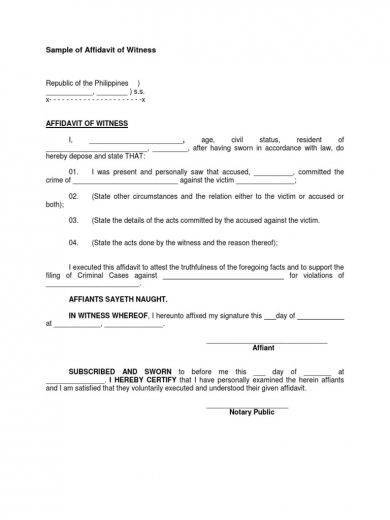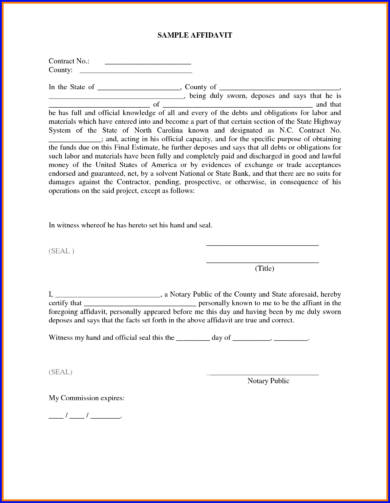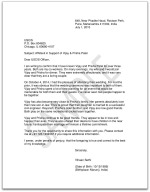23+ Affidavit Form Examples to Download
If you ever find yourself needing to file a case against an individual or an organization, you will need to create an affidavit. This is a formal, written general statement describing the facts on your side of the case.
An affidavit also often serves as evidence in the court of law, which is why it must be sworn upon and affirmed before a legal persona, such as a Commissioner of Oaths or the Justice of the Peace, for it to be considered a credible record. You may also see affidavit of death examples.
Affidavits, which is a name derived from Medieval Latin and means declared upon an oath, are intentionally and voluntarily created by an affiant to verify his simple statements. The authenticity of the documents and its contents is tested, as aforementioned, by a legal persona. Should any information written on it be proved to be untrue in any way, the affiant may be sued for perjury which is punishable by law.
What is Affidavit Form
Affidavit Form Format
[Your Legal Name]
[Your Address]
[City, State, Zip Code]
[Phone Number]
[Email Address]AFFIDAVIT
STATE OF [State]
COUNTY OF [County]I, [Affiant’s Full Name], residing at [Affiant’s Address], in the city of [City], state of [State], do hereby swear and affirm under oath and under penalty of perjury that the following statements are true and accurate to the best of my knowledge and belief:
- [Statement of Fact #1]
- [Statement of Fact #2]
- [Statement of Fact #3]
- [Continue as necessary]
I understand that this affidavit is made for the purpose of [state the purpose of the affidavit] and that any false statement made within it is punishable under the law.
Further Affiant Sayeth Not.
[Affiant’s Signature]
[Date]Subscribed and sworn to (or affirmed) before me this [Day] day of [Month], [Year], by [Affiant’s Name], who is personally known to me or who has produced [type of identification] as identification.
[Notary Public’s Signature]
[Notary Public’s Printed Name]
Commission Number: [Notary’s Commission Number]
My Commission Expires: [Notary’s Commission Expiration Date]
Example of Affidavit Form
John Doe
123 Main Street
Anytown, Anystate, 12345
Phone: (123) 456-7890
Email: johndoe@email.comAFFIDAVIT
STATE OF Anystate
COUNTY OF AnycountyI, John Doe, residing at 123 Main Street, in the city of Anytown, state of Anystate, do hereby swear and affirm under oath and under penalty of perjury that the following statements are true and accurate to the best of my knowledge and belief:
- I am over the age of eighteen (18) years and am fully competent to make this affidavit.
- I am the legal owner of the property located at 123 Main Street, Anytown, Anystate.
- On July 15, 2023, I witnessed a blue sedan car hit the mailbox outside of the aforementioned property and then leave the scene without providing contact information or attempting to notify the property owner.
- I did not recognize the vehicle or the driver as being residents of the neighborhood.
I understand that this affidavit is made for the purpose of providing a factual account of the incident that occurred on July 15, 2023, and that any false statement made within it is punishable under the law.
Further Affiant Sayeth Not.
John Doe
Date: August 1, 2023Subscribed and sworn to (or affirmed) before me this 1st day of August, 2023, by John Doe, who is personally known to me or who has produced state-issued identification as identification.
[Notary Public’s Signature]
Jane Smith
Commission Number: 1234567
My Commission Expires: 01/01/2026
Affidavit Form Examples & Templates
Small Estate Affidavit Form Template
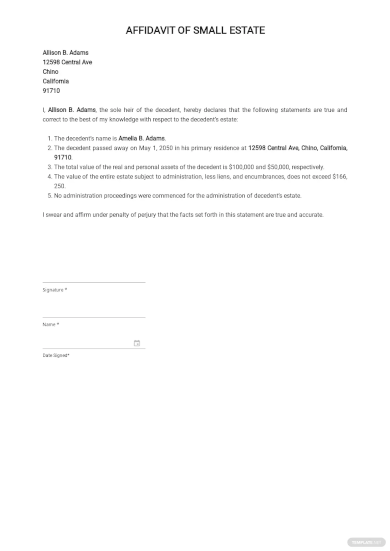
Corporate Acknowledgement Affidavit Form Template
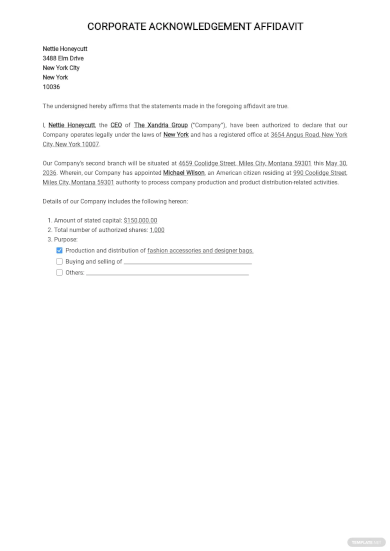
Blank Small Estate Affidavit Form Template
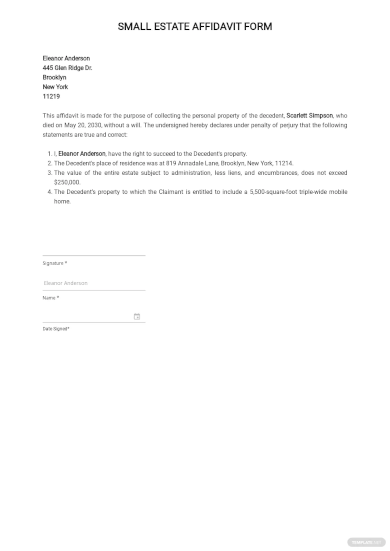
Affidavit Of Heirship Form Template
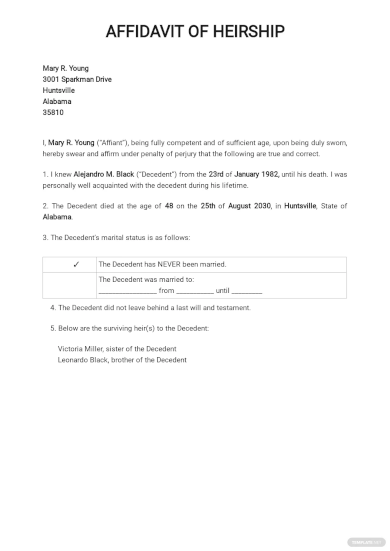
Affidavit of Occupancy Form Template
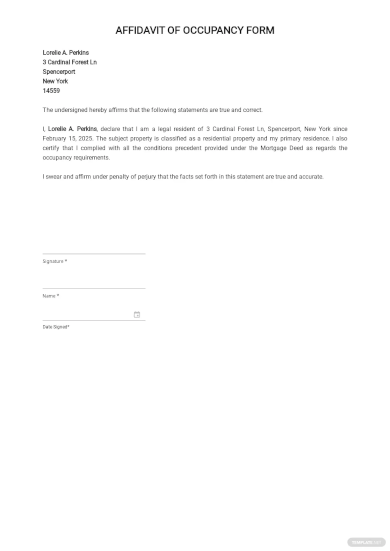
Parent Affidavit of Residency Form Template
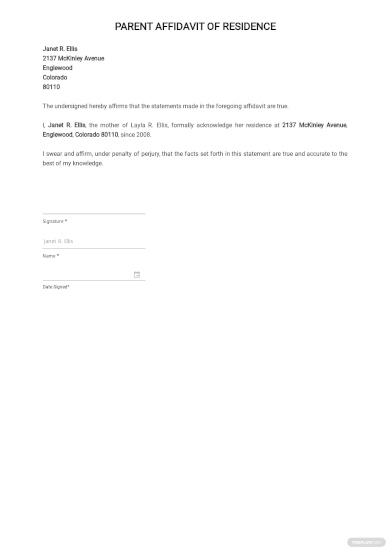
Free Short Form Financial Affidavit Template
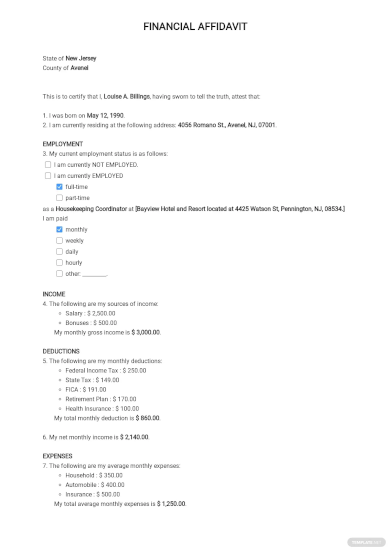
Affidavit Format for Payment Template
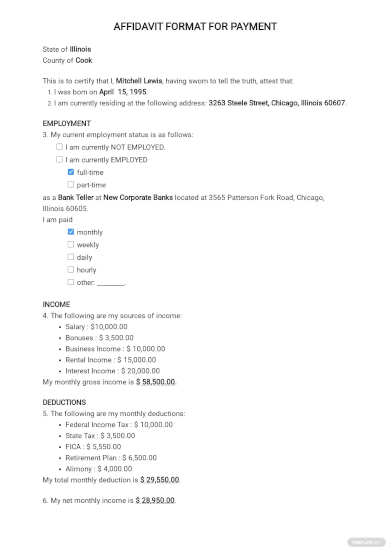
Rental Affidavit Format Template
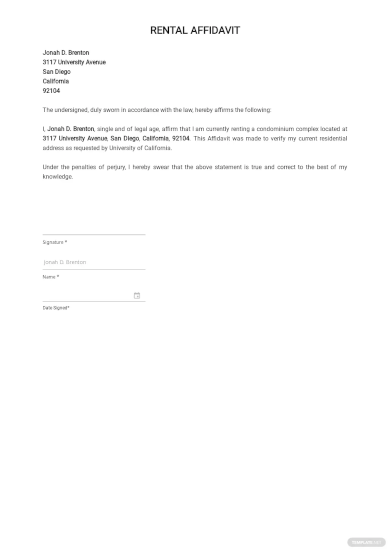
Character Affidavit Format Template
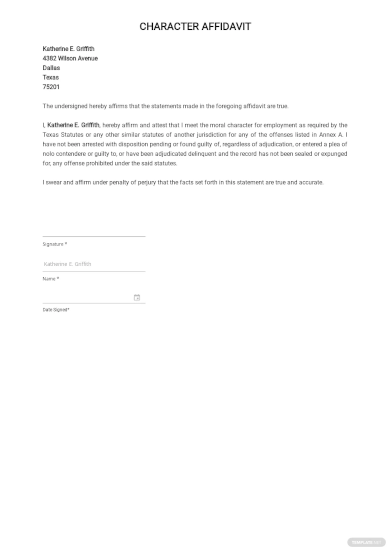
Legal Affidavit Format Template
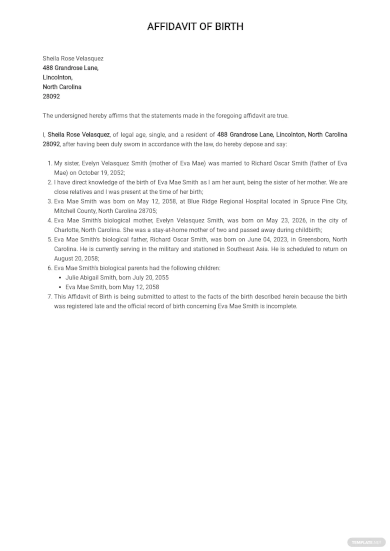
Affidavit of Domicile Example
Basic Affidavit Format
Sample Affidavit Template
Affidavit in Support of Application
Affidavit of Execution
Affidavit of Death
Sworn Affidavit Form Example
Sample Affidavit of Witness
Sample Affidavit
Affidavit Example
Sworn Affidavit Template
Essentially, affidavits are an oath. They will be used alongside a witness to prove the truth of certain statements in the court. However, the contents of an affidavit will be based on the knowledge of the person creating it. Which means that any information that is lacking from his basic statements will not be held against him.
Affidavits may also include opinions, biases, and emotion-based assertions. However, it should be made clear in the document which parts are only opinions and which details are facts.
Affidavits can be created by anyone as long as they are considered mentally capable of doing so. But, in certain cases where an affiant is mentally ill, a legal guardian or close relative may draft the affidavit in behalf of him. Often, the court will inform the parties involved if they need to file an affidavit for the case. You may also see affidavit of marriage examples.
However, for those who have legal supports along with them, their solicitors can inform them about it and even help in creating the document.
Important Things to Remember about Affidavits
1. An affidavit is a written statement that can only be considered valid if it was not forced or coerced from a person. Creating the document must be voluntary.
2. Signing an affidavit would mean that you are willing to testify to the truthfulness of the statement in front of the court. It would also mean that you are mentally (of sound mind) and emotionally (over the age of majority which is usually 18 years old) fit to do so.
3. Creating or attesting to a sworn statement is not a small task. You must be sure that the contents of the document are all true based on the extent of your knowledge on the issue. Otherwise, your oath may be used against you and the punishment for intentionally lying to the law is grave. You may also check out affidavit of heirship form examples.
4. An affidavit can take your place during legal proceedings. If you are indisposed or simply lack the desire to visit the court, your attorney can use this document to express your statements in behalf of you.
5. An affidavit can make other legal instruments valid, particularly in estate planning matters or familial issues.
6. Affidavits may also be used by banks or insurance companies as a part of their basic requirements, which means that the role this document plays is not limited to legal settings.
7. In writing your affidavit, you must plainly narrate the details of the events. Make use of simple English and avoid using metaphors or jargon since they won’t help you express your point. Also, avoid expressing your opinions about the third party involved. Your affidavit is an expression of what happened, not of what you feel about the person involved in the issue. You might be interested in statement of purpose examples.
8. This is a formal, legal document. Be concise and direct with your statements.
When You Can Use an Affidavit Form
An affidavit form is a written statement you can use in various legal and formal situations. It’s made under oath and is legally binding, meaning the person who signs it (the affiant) is asserting that the information contained within is true to the best of their knowledge. Here are several scenarios when you might use an affidavit form:
- Divorces
- Legal Proceedings
- Financial Transactions
- Property Matters
- Personal Situations
- Immigration and Travel
- Business Operations
- Education and Employment
- Insurance and Claims
Types of Affidavits
Affidavits follow a standard form when created. If you seek the help of your legal solicitor, he will know all about it. However, there are different types of affidavits depending on their intended purpose, and this standard form may be edited, although still observed, to recognize the needs of the affiant. You may also see statement analysis examples.
Here is a short list of some of the most common forms of affidavits:
1. Affidavit of Domicile
This affidavit may be necessary when establishing the credibility of a last will and testament or when dealing with certain types of trusts. An affidavit of domicile will seek legal approval of the information of a deceased’s last residence at the time of their death. It will also include the addresses of where he lived prior to that and the length of the time he stayed in those areas. You may also like statement of work examples.
This affidavit may be necessary to make the transfer of assets to the successor of the decedent run smoother. Some banks even require an affidavit of domicile before releasing any property or funds to an heir. It would also be handy to have this document during probate process since it can keep any dispute regarding the will at bay because no one can argue with a legally issued document anymore. You may also check out bank statement examples.
2. Affidavit of Heirship
In cases where a last will and testament has not been prepared before a person has passed, an affidavit of heirship is often the document created to prove to the court that a person is the successor of the properties and other riches that the deceased has left.
It is a way to avoid having to go to a court to create and process a probate will. Instead of going through all that trouble and expenses, an affidavit of heirship can settle the issue just as well. Aside from real estate properties, affidavits of heirship are considered an accepted document to pass on vehicular belongings as well.
Affidavit of heirships work best for situations where there is only one legal heir.
However, if there are other family members involved, which is the case oftentimes, creating an affidavit of heirship will help you establish your case on why you should be the successor of the decedent. But the properties will only be yours if everyone else in the family agrees to it. Each state has slightly different requirements for these cases, so make sure you know yours. You might be interested in business statement examples.
3. Affidavit of Marriage
As the name suggests, an affidavit of marriage is a way for you to prove that you are married to another individual. A certificate of marriage works the same function, but couples can also use an affidavit of heirship in cases where they can’t locate their modern certificate.
This document may be needed to apply for visa or any financial accounts as a married person. An affidavit of marriage is also very useful for states who recognize common law marriage because they do not have certificates of marriage so an affidavit can take its place.
Of course, the couple must sign the affidavit to attest that the marriage is existing and is legally binding. They will also have to provide information about the wedding such as the date when it happened and the state where it was held. A witness must also observe the whole proceeding and the document must be notarized for it to be considered legal. You may also see concept statement examples.
Tips for Writing an Affidavit
If you have decided to draft the document yourself, you need to do your best to make it look and sound official. Here are a few helpful tips you can follow:
1. Use plain language and simple terms.
There is no need to boast your eloquence in this one. The court only wants to hear the story as direct and as literal as possible.
2. Keep it brief.
Get right to the point and avoid any information that will not help you form the story in your statement.
3. Keep it clear and organized.
You can arrange the facts of your statement in bullet form to make it easier to read and understand. Make sure that the sequence of your stories and information are organized well. You may also see profit and loss statement examples.
4. Avoid drama.
If your affidavit contains statements that are not completely stated factually, it may decrease your credibility as the writer. Avoid incorporating your emotions, especially toward the other concerned party, in your affidavit. Stick to the facts. You may also like personal statement examples.
5. Spell-check and proofread the document.
Grammatical errors and misspelled words will not help you make your case. Make sure that you have read your affidavit so thoroughly that you have memorized its contents. Have it signed and notarized only when you are sure that it is finally flawless to a fault. Otherwise, you will have to redraft the whole document since edits are not allowed to be made to an affidavit that has already been signed. You may also check out need statement examples.
Things to NOT Include in an Affidavit
1. As much as possible, avoid expressing your opinions in your affidavit because the court is not interested in them. However, if you must, clearly express that they are merely your belief and don’t take any truthful part in the issue.
2. An exception to the rule about not expressing opinions, however, are experts. For example, the court calls a psychologist or a licensed doctor. Of course their statement will be accepted and trusted because they are not mere opinions as a product of biases or emotions. They are supported by a careful scientific study with evidences to prove the credibility of their words. You might be interested in artist statement examples.
3. Do not include facts that you have only heard from other people as well. These are called hearsay evidence and are not reliable. Stating them in an affidavit in the court of law may only harm your reputation if proven that they are not true. You may also see financial statement examples.
4. Do not refer to anything said to you or anything you have read in any document as reliable information for your affidavit. As much as possible, consult your attorney for this.
5. If you have any document that you can attach along with your affidavit that can strengthen your statements, it would be a big help to your case. These attachments are also called annexures. Each page of the annexures must be signed by whoever created the affidavit. You may also like management statement examples.
6. You can also use the statement of other witnesses that you trust, such as a family member or a close friend, as evidence to support your case. However, this will be a separate case altogether. A child (or an individual under 18 years of age) is not allowed to act as your witness unless the court demands it. You may also check out problem statement examples.
Other Common Affidavits
1. Affidavit of Residence
This document will be used to verify the address of a person irregardless if he is living or not. This may be necessary for business or tax reasons.
2. Affidavit of Name Change
This type of affidavit is only useful to people who have changed their name, and who now need a legally issued document to prove it. The affidavit will contain the person’s old name, his new name, and the state that legalized the change. You may also see scope statement examples.
3. Affidavit of Small Estate
In cases where a person has died without a will and the property he has left is smaller or within the threshold amount, an affidavit of small estate will be necessary to prove this. With the help of the affidavit, releasing the property to the successors of the deceased will be easier and quicker. You may also like vision statement examples.
4. Financial Affidavits
These documents will testify about your financial information which may be necessary for specific familial matters such as filing for a divorce or child support proceedings.
5. Affidavit of Death
An affidavit of death will help you legally testify the death of a person. This document may be necessary for settling financial matters that the person has left unfinished, such as loans, debts, and insurances. However, most of the companies will most likely ask you for a death certificate rather than an affidavit of death. You may also check out mission statement examples.
6. Affidavit of Service
This document is ubiquitous in the corporate setting and legal personalities. An affidavit of service will state that a person has delivered certain documents to another individual or company. It will explain who received the documents and when and where it was delivered. This affidavit is important when handling important, usually legal, documents. You might be interested in income statement examples.
7. Affidavit of Debt
Creditors often use this affidavit to state the amount that a person owes them. These are necessary for cases where the creditor is going through bankruptcy. But affidavits of debt will only be placed second to contracts that thoroughly declare the debt of a person. An affidavit of debt cannot be used as a contract either. You may also see value statement examples.
8. Affidavit of Support
This is a document commonly used during the immigration process. It will have to be signed by someone who is willing to support an immigrant as they learn to adjust to the life abroad.
How to Write Affidavit Form
1. Title and Format
- Begin with a title that clearly identifies the document as an affidavit.
- Include a caption with the legal jurisdiction and case number if it’s related to a specific legal case.
2. Identifying Information
- Start with your full name, address, and occupation to identify yourself as the affiant (the person making the affidavit).
- State that you are swearing or affirming under oath.
3. Statement of Facts
- Clearly and concisely state the facts you are attesting to. Facts should be numbered and presented in logical order.
- Use simple, straightforward language and first-person narrative.
- Ensure all information is accurate and based on your direct knowledge or experience.
4. Purpose of the Affidavit
- Explain why you are making the affidavit. This could be for a court case, financial verification, or any other legal purpose.
5. Oath and Signature
- Include a statement that you swear or affirm that the information provided is true to the best of your knowledge and belief.
- Indicate that you understand the consequences of making false statements under oath.
6. Notarization
- Leave space at the bottom for a notary public to sign and seal the affidavit. This section should include:
- A statement by the notary that you, the affiant, have sworn to or affirmed the contents of the affidavit in their presence.
- The notary’s signature, seal, commission number, and expiry date.


